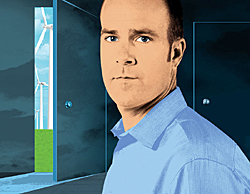sierraclub.org - sierra magazine - november/december 2010 - create
Opportunity Knocks
It's time to stop looking to Congress for leadership. We all need to step up.
 Photo illustration: John Ritter; Brune photo: Lori Eanes
Photo illustration: John Ritter; Brune photo: Lori Eanes
Unwilling to let a looming climate catastrophe get in the way of its August recess, the U.S. Senate failed to pass a climate and energy bill before adjourning. In a summer marked by record heat, devastating floods, disintegrating glaciers, and the worst offshore oil spill in U.S. history, the senators couldn't even muster the initiative to bring a weak bill to a vote.
The day will come when the United States will finally put a real price on greenhouse-gas emissions. But it won't be this year or next, or maybe even this decade. That is shocking, frustrating, and infuriating.
It is not, however, a showstopper. People at the Sierra Club love quoting John Muir, but I'm going to turn to his fellow Scotsman Alexander Graham Bell: "When one door closes, another door opens; but we so often look so long and so regretfully upon the closed door, that we do not see the ones which open for us."
So it's time to stop looking at the closed door of a national climate bill that would have put a price on carbon. Here are some other opportunities that, taken collectively, could do even more to move us into a clean-energy future than a climate bill alone.
When BP's Deepwater Horizon drilling platform exploded in April, the cost of our addiction to petroleum was finally undeniable.
The Sierra Club's Beyond Oil campaign has assembled a chorus of voices from across the country demanding a commitment to get our nation off oil within the next two decades. Petroleum is responsible for 44 percent of our carbon dioxide emissions; moving beyond our inefficient, oil-based transportation system will not only cool the planet but also create jobs and improve public health.
The other big carbon source, of course, is coal. Our strategy here has been simple but effective: Make Big Coal play by the rules. Coal-fired electrical power plants contribute 30 percent of our CO2 emissions along with soot, smog, and mercury. When we insist that current and proposed coal plants clean up to meet basic environmental standards, that suddenly makes the power they produce comparable in price to that from cleaner alternatives. After stopping 133 proposed new coal plants, we're now working to retire up to a quarter of existing plants over the next eight years. That alone would get rid of 10 percent of our total CO2 emissions.
Like moving beyond oil, going beyond coal opens new doors in a new economy. This isn't wishful thinking: It's already happened in South Dakota, Florida, Delaware, Kansas, Iowa, and Idaho. In each of those states, a canceled coal plant prompted major new initiatives for wind or solar.
While moving beyond coal and oil, we have to take account of the damage that's already being done. Because of climate change, we can no longer draw a line around an area and consider it protected. We need to restore the ecosystems that can help shield us from climate-related disasters--like the battered wetlands of the Gulf Coast--and to safeguard the resilient natural habitats where plants and animals will be able to survive on a warmer planet. The Sierra Club has always led the way when it comes to fighting to save our natural treasures. In the future, those natural treasures might very well save us.
It's easy to be angry with Congress, but anger is a luxury we don't have time for. Even without a climate bill, the Sierra Club is moving forward. I'd like to say that nothing can stop us, but that isn't true. Without your active support, any one of these efforts could falter, just like the climate bill did. If you're ready to do your part, a first step is to visit sierraclub.org/climateleaders and become a Sierra Club Climate Leader. Then just open those doors and walk through them.
MICHAEL BRUNE is the executive director of the Sierra Club. You can e-mail him at michael.brune@sierraclub.org and follow him on Twitter and Facebook.